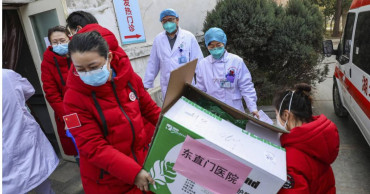global emergency
UN health agency chief declares monkeypox a global emergency
The chief of the World Health Organization said the expanding monkeypox outbreak in more than 70 countries is an “extraordinary” situation that now qualifies as a global emergency, a declaration Saturday that could spur further investment in treating the once-rare disease and worsen the scramble for scarce vaccines.
WHO Director-General Tedros Adhanom Ghebreyesus made the decision to issue the declaration despite a lack of consensus among experts serving on the U.N. health agency's emergency committee. It was the first time the chief of the U.N. health agency has taken such an action.
“We have an outbreak that has spread around the world rapidly through new modes of transmission about which we understand too little and which meets the criteria in the international health regulations,” Tedros said.
“I know this has not been an easy or straightforward process and that there are divergent views among the members" of the committee, he added.
A global emergency is WHO's highest level of alert, but the designation does not necessarily mean a disease is particularly transmissible or lethal. WHO’s emergencies chief, Dr. Michael Ryan, said the director-general made the decision to put monkeypox in that category to endure the gobal community takes the current outbreaks seriously.
Although monkeypox has been established in parts of central and west Africa for decades, it was not known to spark large outbreaks beyond the continent or to spread widely among people until May, when authorities detected dozens of epidemics in Europe, North America and elsewhere.
Declaring a global emergency means the monkeypox outbreak is an “extraordinary event” that could spill over into more countries and requires a coordinated global response. WHO previously declared emergencies for public health crises such as the COVID-19 pandemic, the 2014 West African Ebola outbreak, the Zika virus in Latin America in 2016 and the ongoing effort to eradicate polio.
The emergency declaration mostly serves as a plea to draw more global resources and attention to an outbreak. Past announcements had mixed impact, given that the U.N. health agency is largely powerless in getting countries to act.
Last month, WHO’s expert committee said the worldwide monkeypox outbreak did not yet amount to an international emergency, but the panel convened this week to reevaluate the situation.
According to the U.S. Centers for Disease Control and Prevention, more than 16,000 cases of monkeypox have been reported in 74 countries since about May. To date, monkeypox deaths have only been reported in Africa, where a more dangerous version of the virus is spreading, mainly in Nigeria and Congo.
3 years ago
Summers could soon be ‘too hot for humans’
Global warming will increase the chances of summer conditions that may be "too hot for humans" to work in, exposing millions of people to potentially life threatening conditions.
A study published earlier this year warned that heat stress could affect as many as 1.2bn people by 2100, four times more than now, reports BBC.
Millions around the world could be exposed to dangerous levels of heat stress - a dangerous condition which can cause organs to shut down.
5 years ago
Asia shares mixed as WHO says China virus a global emergency
Shares were mixed in Asia after the World Health Organization declared the outbreak of a new virus that has spread from China to more than a dozen countries a global emergency.
6 years ago
WHO declares global emergency over virus from China
The World Health Organization declared the outbreak sparked by a new virus in China that has spread to more than a dozen countries as a global emergency Thursday after the number of cases spiked more than tenfold in a week.
6 years ago







